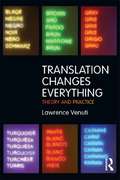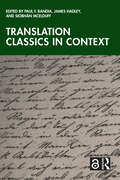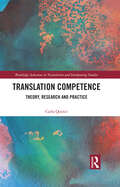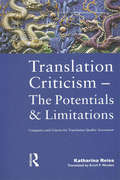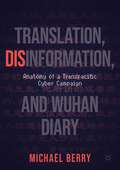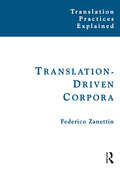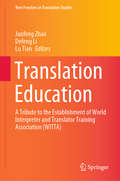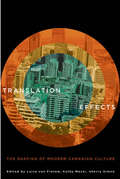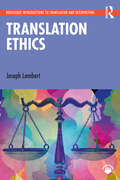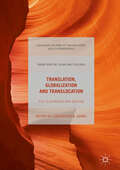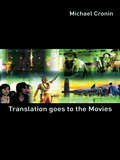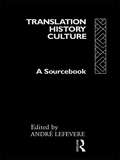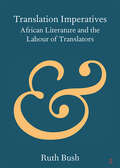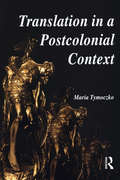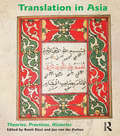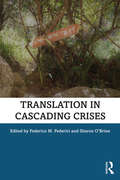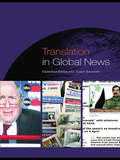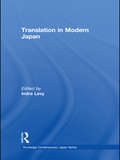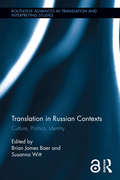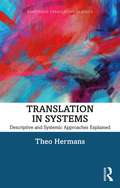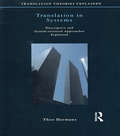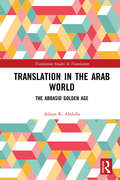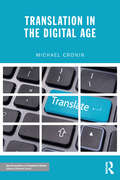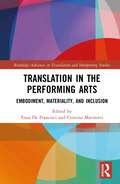- Table View
- List View
Translation Changes Everything: Theory and Practice
by Lawrence VenutiIn Translation Changes Everything leading theorist Lawrence Venuti gathers fourteen of his incisive essays since 2000. The selection sketches the trajectory of his thinking about translation while engaging with the main trends in research and commentary. The issues covered include basic concepts like equivalence, retranslation, and reader reception; sociological topics like the impact of translations in the academy and the global cultural economy; and philosophical problems such as the translator’s unconscious and translation ethics. Every essay presents case studies that include Venuti’s own translation projects, illuminating the connections between theoretical concepts and verbal choices. The texts, drawn from a broad variety of languages, are both humanistic and pragmatic, encompassing such forms as poems and novels, religious and philosophical works, travel guidebooks and advertisements. The discussions all explore practical applications, whether writing, publishing, reviewing, teaching or studying translations. Venuti’s aim is to conceive of translation as an interpretive act with far-reaching social effects, at once enabled and constrained by specific cultural situations. This latest chapter in his developing work is essential reading for translators and students of translation alike.
Translation Classics in Context
by Paul F. BandiaTranslation Classics in Context carefully considers the relationship between translation and the classics. It presents readers with revelatory and insightful case studies that investigate translations produced as part of nexuses of colonial resistance and liberation across Africa and in Ireland; translations of novels and folklore collections that influence not just other fictions, but stage productions and entire historical disciplines; struggles over Ukrainian and Russian literature and how it is shaped and transferred; and the role of the academy and the curriculum in creating notions of classic translations.Along the way it covers oral poetry, saints, scholars, Walter Scott and Jules Verne, not to mention Leo Tolstoy and the Corpse Bride making her way from folklore to Frankenstein and into the world of Disney animation. Contributors are all leading scholars, and the book is accessible and engaging, assuming no specialist knowledge.Chapter 6 of this book is freely available as a downloadable Open Access PDF at http://www.taylorfrancis.com under a Creative Commons Attribution-Non Commercial-No Derivatives (CC-BY-NC-ND) 4.0 license.
Translation Competence: Theory, Research and Practice (Routledge Advances in Translation and Interpreting Studies)
by Carla QuinciThis book offers a systematic and comprehensive account of translation competence (TC), reflecting on its different models and conceptualisations throughout its development and outlining future directions for both theory and practice. The volume charts the evolution of TC in line with related findings in empirical product- and process-oriented research. In critically examining the different models of translation competence, Quinci explores a wide range of connected issues of ongoing debate within Translation Studies, including translation quality, the revision process, and translator self-assessment. The second section of the book investigates these themes at work in the design, conduct, and results of an award-winning longitudinal research project which analysed the acquisition and development of TC in a sample group of translation trainees and professional translators. The volume builds on the outcomes of this project to offer practical activities for translator education, informed by theory and empirical research, toward encouraging continued reflection and new directions for translation competence research and practice. This book will be of interest to scholars in Translation Studies, as well as translation trainees and active translation professionals.
Translation Criticism – The Potentials And Limitations: Categories and Criteria for Translation Quality Assessment
by Katharina ReissKatharina Reiss's now classic contribution to Translation Studies, Möglichkeiten und Grenzen der Übersetzungskritik: Kategorien und Kriteren für eine sachgerechte Beurteilung von Übersetzungen, first appeared in 1971. This is the first English translation of this major work, allowing students and practitioners of translation in the English-speaking world to make more extensive use of Reiss's pioneering treatment of a central theme in translation: how to develop reliable criteria for the systematic evaluation of translations. Using a wealth of interesting and varied examples, Reiss offers a systematic and illuminating text typology, a pragmatic approach to text analysis, a functional perspective on translation and a hermeneutic view of the translator, thus accounting for some of the most important aspects of the translation process: the text (both source and target versions), the conditions which determine the translator's decisions, and the translator as an individual whose personal interpretation has to be respected by any critic. In the three decades since Katharina Reiss wrote, the terminology of translation studies has evolved on many fronts. Erroll Rhodes' translation strikes an optimal balance between remaining faithful to the original presentation and using terminology that today's reader would generally understand and value.
Translation, Disinformation, and Wuhan Diary: Anatomy of a Transpacific Cyber Campaign
by Michael BerryDuring the early days of the COVID-19 health crisis, Fang Fang’s Wuhan Diary provided an important portal for people around the world to understand the outbreak, local response, and how the novel coronavirus was impacting everyday people. But when news of the international publication of Wuhan Diary appeared online in early April of 2020, Fang Fang’s writings became the target of a series of online attacks by “Chinese ultra-nationalists.” Over time, these attacks morphed into one of the most sophisticated and protracted hate Campaigns against a Chinese writer in decades. Meanwhile, as controversy around Wuhan Diary swelled in China, the author was transformed into a global icon, honored by the BBC as one of the most influential women of 2020 and featured in stories by dozens of international news outlets. This book, by the translator of Wuhan Diary into English, alternates between a first-hand account of the translation process and more critical observations on how a diary became a lightning rod for fierce political debate and the target of a sweeping online campaign that many described as a “cyber Cultural Revolution.” Eventually, even Berry would be pulled into the attacks and targeted by thousands of online trolls. This book answers the questions: why would an online lockdown diary elicit such a strong reaction among Chinese netizens? How did the controversy unfold and evolve? Who was behind it? And what can we learn from the “Fang Fang Incident” about contemporary Chinese politics and society? The book will be of interest to students and scholars of translation, as well as anyone with special interest in translation, US-Chinese relations, or internet culture more broadly.
Translation-Driven Corpora: Corpus Resources for Descriptive and Applied Translation Studies (Translation Practices Explained)
by Federico ZanettinElectronic texts and text analysis tools have opened up a wealth of opportunities to higher education and language service providers, but learning to use these resources continues to pose challenges to scholars and professionals alike. Translation-Driven Corpora aims to introduce readers to corpus tools and methods which may be used in translation research and practice. Each chapter focuses on specific aspects of corpus creation and use. An introduction to corpora and overview of applications of corpus linguistics methodologies to translation studies is followed by a discussion of corpus design and acquisition. Different stages and tools involved in corpus compilation and use are outlined, from corpus encoding and annotation to indexing and data retrieval, and the various methods and techniques that allow end users to make sense of corpus data are described. The volume also offers detailed guidelines for the construction and analysis of multilingual corpora. Corpus creation and use are illustrated through practical examples and case studies, with each chapter outlining a set of tasks aimed at guiding researchers, students and translators to practice some of the methods and use some of the resources discussed. These tasks are meant as hands-on activities to be carried out using the materials and links available in an accompanying DVD. Suggested further readings at the end of each chapter are complemented by an extensive bibliography at the end of the volume. Translation-Driven Corpora is designed for use by teachers and students in the classroom or by researchers and professionals for self-learning. It is an invaluable resource for anyone interested in this fast growing area of scholarly and professional activity.
Translation Education: A Tribute to the Establishment of World Interpreter and Translator Training Association (WITTA) (New Frontiers in Translation Studies)
by Junfeng Zhao Defeng Li Lu TianThis book features invited contributions based on the presentations at the First World Interpreter and Translator Training Association (WITTA) Congress, held in Guangzhou, China, in November 2016. Covering a wide range of topics in translation education, it includes papers on the latest developments in the field, theoretical discussions, and the practical implementation of translation courses and programs. Given its scope, the book appeals to translation scholars and practitioners, education policymakers, and language and education service providers.
Translation Effects: The Shaping of Modern Canadian Culture
by Kathy Mezei, Sherry Simon and Luise von FlotowMuch of Canadian cultural life is sustained and enriched by translation. Translation Effects moves beyond restrictive notions of official translation in Canada, analyzing its activities and effects on the streets, in movie theatres, on stages, in hospitals, in courtrooms, in literature, in politics, and across café tables. The first comprehensive study of the intersection of translation and culture, Translation Effects offers an original picture of translation practices across many languages and through several decades of Canadian life. The book presents detailed case studies of specific events and examines the reverberation and spread of their effects. Through these imaginative, at times unusual, investigations, the contributors unveil the simultaneous invisibility and omnipresence of translation and present a cross-cut of Canadian translation moments. Addressing the period from the 1950s to the present and including a wide scope of examples from medical interpreting to film dubbing, the essays in this book create a panoramic view of the creation of modern culture in Canada. Contributors include Piere Anctil (University of Ottawa), Hélène Buzelin (Université de Montréal), Alessandra Capperdoni (Simon Fraser University), Philippe Cardinal, Andrew Clifford (York University), Beverley Curran, Renée Desjardins (University of Ottawa), Ray Ellenwood, David Gaertner, Chantal Gagnon (Université de Montréal), Patricia Godbout, Hugh Hazelton, Jane Koustas (Brock University), Louise Ladouceur (Université de l'Albera, Gillian Lane-Mercier (McGill University), George Lang, Rebecca Margolis, Sophie McCall (Simon Fraser University), Julie Dolmaya McDonough, Denise Merkle (Université de Moncton), Kathy Mezei, Sorouja Moll, Brian Mossop, Daisy Neijmann, Glen Nichols (Mount Allison University), Joseph Pivato, Gregory Reid, Robert Schwartzwald, Sherry Simon, Luise von Flotow (University of Ottawa), and Christine York.
Translation Effects
by Kathy Mezei Sherry Simon Luise Von FlotowMuch of Canadian cultural life is sustained and enriched by translation. Translation Effects moves beyond restrictive notions of official translation in Canada, analyzing its activities and effects on the streets, in movie theatres, on stages, in hospitals, in courtrooms, in literature, in politics, and across café tables. The first comprehensive study of the intersection of translation and culture, Translation Effects offers an original picture of translation practices across many languages and through several decades of Canadian life. The book presents detailed case studies of specific events and examines the reverberation and spread of their effects. Through these imaginative, at times unusual, investigations, the contributors unveil the simultaneous invisibility and omnipresence of translation and present a cross-cut of Canadian translation moments. Addressing the period from the 1950s to the present and including a wide scope of examples from medical interpreting to film dubbing, the essays in this book create a panoramic view of the creation of modern culture in Canada. Contributors include Piere Anctil (University of Ottawa), Helene Buzelin (Université de Montréal), Alessndra Capperdoni (Simon Fraser University), Philippe Cardinal, Andrew Clifford (York University), Beverley Curran, Renée Desjardins (University of Ottawa), Ray Ellenwood, David Gaertner, Chantal Gagnon (Université de Montréal), Patricia Godbout, Hugh Hazelton, Jane Koustas (Brock University), Louise Ladouceur ( Université de l'Albera, Gillian Lane-mercier (McGill University), George Lang, Rebecca Margolis, Sophie McCall (Simon Fraser University), Dolmaya McDonough, Denise Merkle (Université de Moncton), Kathy Mezei, Sorouja Moll, Brian Mossop, Daisy Neijmann, Glen Nichols ( Mount Allison University), Joseph Pivato, Gregory Reid, Robert Schwartzwald, Sherry Simon, Luise von Flotow (University of Ottawa), and Christine York.
Translation Ethics (Routledge Introductions to Translation and Interpreting)
by Joseph LambertTranslation Ethics introduces the topic of ethics for students, researchers, and professional translators. Based on a successful course and written by an experienced instructor, the Introduction and nine core chapters offer an accessible examination of a wide range of interlocking topic areas, which combine to form a cohesive whole, guiding students through the key debates. Built upon a theoretical background founded in philosophy and moral theory, it outlines the main contributions in the area and traces the development of thought on ethics from absolutism to relativism, or, from staunchly-argued textual viewpoints to current lines of thought placing the translator as agent and an active – even interventionary – mediator. The textbook then examines the place of ethical enquiry in the context of professional translation, critiquing provision such as codes of ethics. Each chapter includes key discussion points, suggested topics for essays, presentations, or in-class debates, and an array of contextualised examples and case studies. Additional resources, including videos, weblinks, online activities, and PowerPoint slide presentations on the Routledge Translation studies portal provide valuable extra pedagogical support. This wide-ranging and accessible textbook has been carefully designed to be key reading for a wide range of courses, including distance-learning courses, from translation and interpreting ethics to translation theory and practice.
Translation, Globalization and Translocation
by Concepción B. GodevThis book examines the spaces where translation and globalization intersect, whether they be classrooms, communities, or cultural texts. It foregrounds the connections between cultural analysis, literary critique, pedagogy and practice, uniting the disparate fields that operate within translation studies. In doing so, it offers fresh perspectives that will encourage the reader to reappraise translation studies as a field, reaffirming the directions that the subject has taken over the last twenty years. Offering a comprehensive analysis of the links between translation and globalization, this ambitious edited collection will appeal to students and scholars who work in any area of translation studies.
Translation goes to the Movies
by Michael CroninThis highly accessible introduction to translation theory, written by a leading author in the field, uses the genre of film to bring the main themes in translation to life. Through analyzing films as diverse as the Marx Brothers’ A Night at the Opera, The Star Wars Trilogies and Lost in Translation, the reader is encouraged to think about both issues and problems of translation as they are played out on the screen and issues of filmic representation through examining the translation dimension of specific films. In highlighting how translation has featured in both mainstream commercial and arthouse films over the years, Cronin shows how translation has been a concern of filmmakers dealing with questions of culture, identity, conflict and representation. This book is a lively and accessible text for translation theory courses and offers a new and largely unexplored approach to topics of identity and representation on screen. Translation Goes to the Movies will be of interest to those on translation studies and film studies courses.
Translation/History/Culture: A Sourcebook (Translation Studies)
by André LefevereThe most important and productive statements on the translation of literature from Roman times to the 1920s are collected in this book. Arranged thematically around the main topics which recur over the centuries - power, poetics, universe of discourse, language, education - it contains texts previously unavailable in English, and translated here for the first time from classical, Medieval, and Renaissance Latin, from French and from German. As the first survey of its kind in both scope and selection it argues that translation commands a central position in the shaping of European literatures and cultures. ^Translation/History/Culture creates a framework for further study of the history of translation in the West by tracing European historical thought about translation, and discussing the topicality of many of the texts included.
Translation Imperatives: African Literature and the Labour of Translators (Elements in Publishing and Book Culture)
by Ruth BushThis Element explores the politics of literary translation via case studies from the Heinemann African Writers Series and the work of twenty-first-century literary translators in Cameroon. It intervenes in debates concerning multilingualism, race and decolonization, as well as methodological discussion in African literary studies, world literature, comparative literature and translation studies. The task of translating African literary texts has developed according to political and socio-economic contexts. It has contributed to the consecration of a canon of African classics and fuelled polemics around African languages. Yet retranslation remains rare and early translations are frequently criticised. This Element's primary focus on the labour rather than craft or art of translation emphasises the material basis that underpins who gets to translate and how that embodied labour occurs within the process of book production and reception. The arguments draw on close readings, fresh archival material, interviews, and co-production and observation of literary translation workshops.
Translation in a Postcolonial Context: Early Irish Literature in English Translation
by Maria TymoczkoThis ground-breaking analysis of the cultural trajectory of England's first colony constitutes a major contribution to postcolonial studies, offering a template relevant to most cultures emerging from colonialism. At the same time, these Irish case studies become the means of interrogating contemporary theories of translation. Moving authoritatively between literary theory and linguistics, philosophy and cultural studies, anthropology and systems theory, the author provides a model for a much needed integrated approach to translation theory and practice. In the process, the work of a number of important literary translators is scrutinized, including such eminent and disparate figures as Standishn O'Grady, Augusta Gregory and Thomas Kinsella. The interdependence of the Irish translation movement and the work of the great 20th century writers of Ireland - including Yeats and Joyce - becomes clear, expressed for example in the symbiotic relationship that marks their approach to Irish formalism. Translation in a Postcolonial Context is essential reading for anyone interested in translation theory and practice, postcolonial studies, and Irish literature during the 19th and 20th centuries.
Translation in Asia: Theories, Practices, Histories
by Ronit Ricci Jan van der PuttenThe field of translation studies was largely formed on the basis of modern Western notions of monolingual nations with print-literate societies and monochrome cultures. A significant number of societies in Asia – and their translation traditions – have diverged markedly from this model. With their often multilingual populations, and maintaining a highly oral orientation in the transmission of cultural knowledge, many Asian societies have sustained alternative notions of what ‘text’, ‘original’ and ‘translation’ may mean and have often emphasized ‘performance’ and ‘change’ rather than simple ‘copying’ or ‘transference’. The contributions in Translation in Asia present exciting new windows into South and Southeast Asian translation traditions and their vast array of shared, inter-connected and overlapping ideas about, and practices of translation, transmitted between these two regions over centuries of contact and exchange. Drawing on translation traditions rarely acknowledged within translation studies debates, including Tagalog, Tamil, Kannada, Malay, Hindi, Javanese, Telugu and Malayalam, the essays in this volume engage with myriad interactions of translation and religion, colonialism, and performance, and provide insight into alternative conceptualizations of translation across periods and locales. The understanding gained from these diverse perspectives will contribute to, complicate and expand the conversations unfolding in an emerging ‘international translation studies’.
Translation in Cascading Crises
by Sharon O'Brien Federico FedericiThis volume addresses the imperative need for recognizing, exploring, and developing the role of multilingual communication in crisis settings. It is recognized that 'communication is aid' and that access to communication is an undeniable human right in crises. Even where effective and accurate information is available to be distributed, circulated, and broadcast in different ways through an ever-growing array of technologies, too often the language barrier remains in place. From the Philippines to Lebanon via Spain, Italy, Columbia, and the UK, crisis situations occur worldwide, with different cultural reactions and needs everywhere. The contributors of this volume represent a geographical mixture of regions, language combinations, and disciplines, because crisis situations need to be studied in their locale with different methods. Drawing on disaster studies research, this book aims to stimulate a broad, multidisciplinary debate on how complex communication is in cascading crises and on the role translation can play to facilitate communication. Translation in Cascading Crises is a key resource for students and researchers of Translation and Interpreting Studies, Humanitarian Studies, and Disaster Studies.
Translation in Global News
by Esperanca Bielsa Susan BassnettThe mass media are of paramount importance in the formulation and transmission of messages about key developments of global significance, such as terrorism and the war in Iraq, yet the key mediating role of translation in the reception of speeches and addresses of figures like Osama Bin Laden and Saddam Hussein has remained largely invisible. Incorporating the results of extensive fieldwork in key global news organizations such as Reuters, Agence France Press and Inter Press Service, this book addresses central issues relating to the new pressures on translation arising from globalization, analyzing new texts from major news agencies as well as alternative media organizations. Co-written by Susan Bassnett, a leading figure in the field of translation studies, this book presents close readings of different English versions of key Arabic texts circulated in Western media to demonstrate the ways in which a cultural and religious 'Other' is framed in different media.
Translation in Modern Japan (Routledge Contemporary Japan Series)
by Indra LevyThe role of translation in the formation of modern Japanese identities has become one of the most exciting new fields of inquiry in Japanese studies. This book marks the first attempt to establish the contours of this new field, bringing together seminal works of Japanese scholarship and criticism with cutting-edge English-language scholarship. Collectively, the contributors to this book address two critical questions: 1) how does the conception of modern Japan as a culture of translation affect our understanding of Japanese modernity and its relation to the East/West divide? and 2) how does the example of a distinctly East Asian tradition of translation affect our understanding of translation itself? The chapter engage a wide array of disciplines, perspectives, and topics from politics to culture, the written language to visual culture, scientific discourse to children's literature and the Japanese conception of a national literature. Translation in Modern Japan will be of huge interest to a diverse readership in both Japanese studies and translation studies as well as students and scholars of the theory and practice of Japanese literary translation, traditional and modern Japanese history and culture, and Japanese women’s studies.
Translation in Russian Contexts: Culture, Politics, Identity (Routledge Advances in Translation and Interpreting Studies)
by Brian James Baer Susanna WittThis volume represents the first large-scale effort to address topics of translation in Russian contexts across the disciplinary boundaries of Slavic Studies and Translation Studies, thus opening up new perspectives for both fields. Leading scholars from Eastern and Western Europe offer a comprehensive overview of Russian translation history examining a variety of domains, including literature, philosophy and religion. Divided into three parts, this book highlights Russian contributions to translation theory and demonstrates how theoretical perspectives developed within the field help conceptualize relevant problems in cultural context in pre-Soviet, Soviet, and post-Soviet Russia. This transdisciplinary volume is a valuable addition to an under-researched area of translation studies and will appeal to a broad audience of scholars and students across the fields of Translation Studies, Slavic Studies, and Russian and Soviet history.
Translation in Systems: Descriptive and Systemic Approaches Explained (Routledge Translation Classics)
by Theo HermansA critically acclaimed foundational text, Translation in Systems offers a comprehensive guide to the descriptive and systemic approaches which have shaped translation studies. Theo Hermans considers translation norms, equivalence, polysystems and social systems, covering a wide range of theorists in his discussion of the principles of translation studies. Reissued with a new foreword by Kathryn Batchelor, which updates the text for a new generation of readers, Translation in Systems endures partly on account of Hermans’s vivid and articulate writing style. The book covers the fundamental problems of translation norms, equivalence, polysystems and social systems, encompassing not only the work of Levý, Holmes, Even-Zohar, Toury, Lefevere, Lambert, Bassnett, D'hulst and others, but also giving special attention to contributions derived from Pierre Bourdieu and Niklas Luhmann. Hermans explains how contemporary descriptive approaches came about, what the basic ideas were, how those ideas have evolved over time, and offers a critique of these approaches. With practical questions of how to investigate translation (including problems of definition, description and assessment of readerships), this is essential reading for graduate students and researchers in translation studies and related areas.
Translation in Systems: Descriptive and System-oriented Approaches Explained (Translation Theories Explored #Vol. 7)
by Theo HermansThe notion of systems has helped revolutionize translation studies since the 1970s. As a key part of many descriptive approaches, it has broken with the prescriptive focus on what translation should be, encouraging researchers to ask what translation does in specific cultural settings. From his privileged position as a direct participant in these developments, Theo Hermans explains how contemporary descriptive approaches came about, what the basic ideas were, and how those ideas have evolved over time. His discussion addresses the fundamental problems of translation norms, equivalence, polysystems and social systems, covering not only the work of Levý, Holmes, Even-Zohar, Toury, Lefevere, Lambert, Van Leuven-Zwart, Dhulst and others, but also giving special attention to recent contributions derived from Pierre Bourdieu and Niklas Luhmann. An added focus on practical questions of how to investigate translation (problems of definition, description, assessment of readerships, etc.) makes this book essential reading for graduate students and indeed any researchers in the field. Hermans' account of descriptive translation studies is both informed and critical. At the same time, he demonstrates the strength of the basic concepts, which have shown considerable vitality in their evolution and adaptation to the debates of the present day.
Translation in the Arab World: The Abbasid Golden Age (Translation Studies in Translation)
by Adnan K. AbdullaThe Translation Movement of the Abbasid Period, which lasted for almost three hundred years, was a unique event in world history. During this period, much of the intellectual tradition of the Greeks, Persians, and Indians was translated into Arabic—a language with no prior history of translation or of science, medicine, or philosophy. This book investigates the cultural and political conflicts that translation brought into the new Abbasid state from a sociological perspective, treating translation as a process and a product. The opening chapters outline the factors involved in the initiation and cessation of translational activity in the Abbasid period before dealing in individual chapters with important events in the Translation Movement, such as the translation of Aristotle’s Poetics into Arabic, Abdullah ibn al-Muqaffa’s seminal translation of the Indian/Persian Kalilah wa Dimna into Arabic and the translation of scientific texts. Other chapters address the question of whether the Abbasids had a theory of translation and why, despite three hundred years of translation, not a single poem was translated into Arabic. The final chapter deals with the influence of translation during this period on the Arabic language. Offering new readings of many issues that are associated with that period, informed by modern theories of translation, this is key reading for scholars and researchers in Translation Studies, Oriental and Arab Studies, Book History and Cultural History.
Translation in the Digital Age (New Perspectives in Translation and Interpreting Studies)
by Michael CroninTranslation is living through a period of revolutionary upheaval. The effects of digital technology and the internet on translation are continuous, widespread and profound. From automatic online translation services to the rise of crowdsourced translation and the proliferation of translation Apps for smartphones, the translation revolution is everywhere. The implications for human languages, cultures and society of this revolution are radical and far-reaching. In the Information Age that is the Translation Age, new ways of talking and thinking about translation which take full account of the dramatic changes in the digital sphere are urgently required. Michael Cronin examines the role of translation with regard to the debates around emerging digital technologies and analyses their social, cultural and political consequences, guiding readers through the beginnings of translation's engagement with technology, and through to the key issues that exist today. With links to many areas of study, Translation in the Digital Age is a vital read for students of modern languages, translation studies, cultural studies and applied linguistics.
Translation in the Performing Arts: Embodiment, Materiality, and Inclusion (Routledge Advances in Translation and Interpreting Studies)
by Enza De FrancisciThis innovative collection showcases the interconnectedness of translation and the performing arts, drawing on examples spanning languages, eras, and modes of performance to argue for the importance of re-envisioning translation beyond writing.Featuring contributions from established and emerging scholars, the volume builds on recent epistemological shifts from a genre-based view of translation toward a material-based approach interested in how performance and embodiment shape translation. Chapters highlight the ways in which, in the nexus of translation and performing arts, we can situate the cross-cultural encounters and transnational exchanges that underpin translation beyond the ideology of print, and help us to better understand the international circulation of performative works. The volume covers a wide range of embodied practices from immersive theatre and intercultural opera to dance and sign language performance, while also incorporating key perspectives from interviews with active practitioners. Taken together, the collection makes the case for a more nuanced understanding of translation, one which accounts for the relationships between translation and the myriad forms of performance that permeate daily life.This book will be of particular interest to students and scholars in translation studies, visual culture, theatre translation, performing arts, literary studies, media studies, and reception studies.
